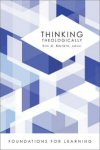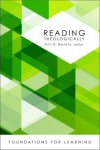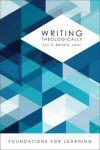Thinking, Reading, and Writing Theologically, 3 vols. (Foundations for Learning))
Digital Logos Edition
Overview
Thinking, reading, and writing are three key skills that are indispensable for academic and professional success. These volumes demystify these three areas of competence in the field of theology with a collection of readable essays from seminary educators, pastors, and theologians. Though these books are profoundly practical and useful for students, they are also valuable for anyone in ministry who seeks to grapple with theological ideas and communicate them clearly and effectively to others.
In the Logos editions, these volumes are enhanced by amazing functionality. Important terms link to dictionaries, encyclopedias, and a wealth of other resources in your digital library. Perform powerful searches to find exactly what you’re looking for. Take the discussion with you using tablet and mobile apps. With Logos Bible Software, the most efficient and comprehensive research tools are in one place, so you get the most out of your study.
Looking for more great titles in this series? Check out the Foundations for Learning Series (6 vols.).

Key Features
- Includes contributions from a wide variety of seminary educators and pastors
- Helps develop key skills for communicating theology effectively
- Offers practical insights for students and ministers alike
Product Details
- Title: Thinking, Reading, and Writing Theologically
- Editor: Eric D. Barreto
- Series: Foundations for Learning
- Publisher: Fortress Press
- Volumes: 3
- Pages: 444
- Resource Type: Topical
- Topic: Ministry Resources, Theology
Individual Titles

We are constantly engaged in processing data and sensory inputs all around us, even when we are not conscious of the many neural pathways our minds are traveling. So taking a step back to ponder the dimensions and practices of a particular way of thinking is a challenge. Even more important, however, is cultivating the habits of mind necessary in a life of ministry. This book, therefore, will grapple with the particular ways that the theological disciplines invite students to think but also the ways in which thinking theologically shapes a student’s sense of self and his or her role in a wider community of belief and thought. Thinking theologically is not just a cerebral matter; thinking theologically invokes an embodied set of practices and values that shape individuals and communities alike. Thinking theologically demands both intellect and emotion, logic and compassion, mind and body. In fact, this book—as part of the Foundations for Learning series—will contend that these binaries are actually integrated wholes, not mutually exclusive options.
Thinking Theologically is an engaging text that is clearly oriented towards the church and those who are seeking to understand Scripture and theology in light of the world’s complexities.
—Brian Bantum, associate professor of theology, Seattle Pacific University and Seminary

Reading is one of the basic skills a student needs. But reading is not just an activity of the eyes and the brain. Reading Theologically, edited by Eric D. Barreto, brings together eight seminary educators from a variety of backgrounds to explore what it means to be a reader in a seminary context—to read theologically.
Reading theologically involves a specific mindset and posture towards texts and ideas, people and communities alike. Reading theologically is not just about academic skill building but about the formation of a ministerial leader who can engage scholarship critically, interpret Scripture and tradition faithfully, welcome different perspectives, and help lead others to do the same.
This concise volume emphasizes the vital skills, habits, practices, and values involved in reading theologically. Reading Theologically is a vital resource for students beginning the seminary process and professors of introductory level seminary courses.
Reading Theologically comes as a great gift to students at seminaries and divinity schools. The thoughtful essays in this collection will help students develop deeply rooted practices of reading—gracefully, mindfully, attentively—that will position them to be more engaged interpreters of religious texts and traditions and more effective guides for the people they will serve. Written in a very accessible style, this book will be a first read for many theological students.
—Gail R. O’Day, dean, Wake Forest University School of Divinity

Of course, by writing we refer to the kinds of reflections, essays, and exams students will have to complete in the seminary classroom. But writing also encompasses the many modes of communication and self-discovery that creative expression can unlock. Writing Theologically introduces writing not just as an academic exercise but as a way for students to communicate the good news in rapidly changing contexts, as well as to discover and craft their own sense of vocation and identity. Most importantly, it will guide students to how they might begin to claim and hone a distinctive theological voice that is particularly attuned to the contexts of writer and audience alike.
In a collection of brief, readable essays, this volume emphasizes the vital skills, practices, and values involved in writing theologically. That is, how might students prepare themselves to communicate effectively and creatively, clearly and beautifully, the insights they gather during their time in seminary? Each contribution includes practical advice about best practices in writing theologically; however, the book also stresses why writing is vital in the self-understanding of the minister, as well as her or his public communication of the good news.
For those called to ministry and theology who are anxious about one of the essentials task of theological studies, Writing Theologically provides a readable and encouraging introduction to developing the skills of theological writing, not as an observer, but a practitioner. The authors provide creative guidance and practical advice that will help a person to become competent in theological writing, recognize its potential for ministry, and learn to enjoy it as well.
—Edwin David Aponte, dean, Palmer Theological Seminary of Eastern University
About Eric D. Barreto
Eric D. Barreto is associate professor of New Testament at Luther Seminary in St. Paul, Minnesota, and was ordained by Peachtree Baptist Church in 2006. He is the author of Ethnic Negotiations: The Function of Race and Ethnicity in Acts 16 and editor of the Foundations for Learning Series (6 vols.).
This title is included in the following collections
You can save when you purchase this product as part of a collection.
2025 Lutheran Portfolio
$4,749.99$4,037.492025 Ultimate Library
$23,999.99$20,399.99
Reviews
2 ratings

DavePL HI Haoli KI
1/13/2017
Quintin Betteridge
3/3/2016